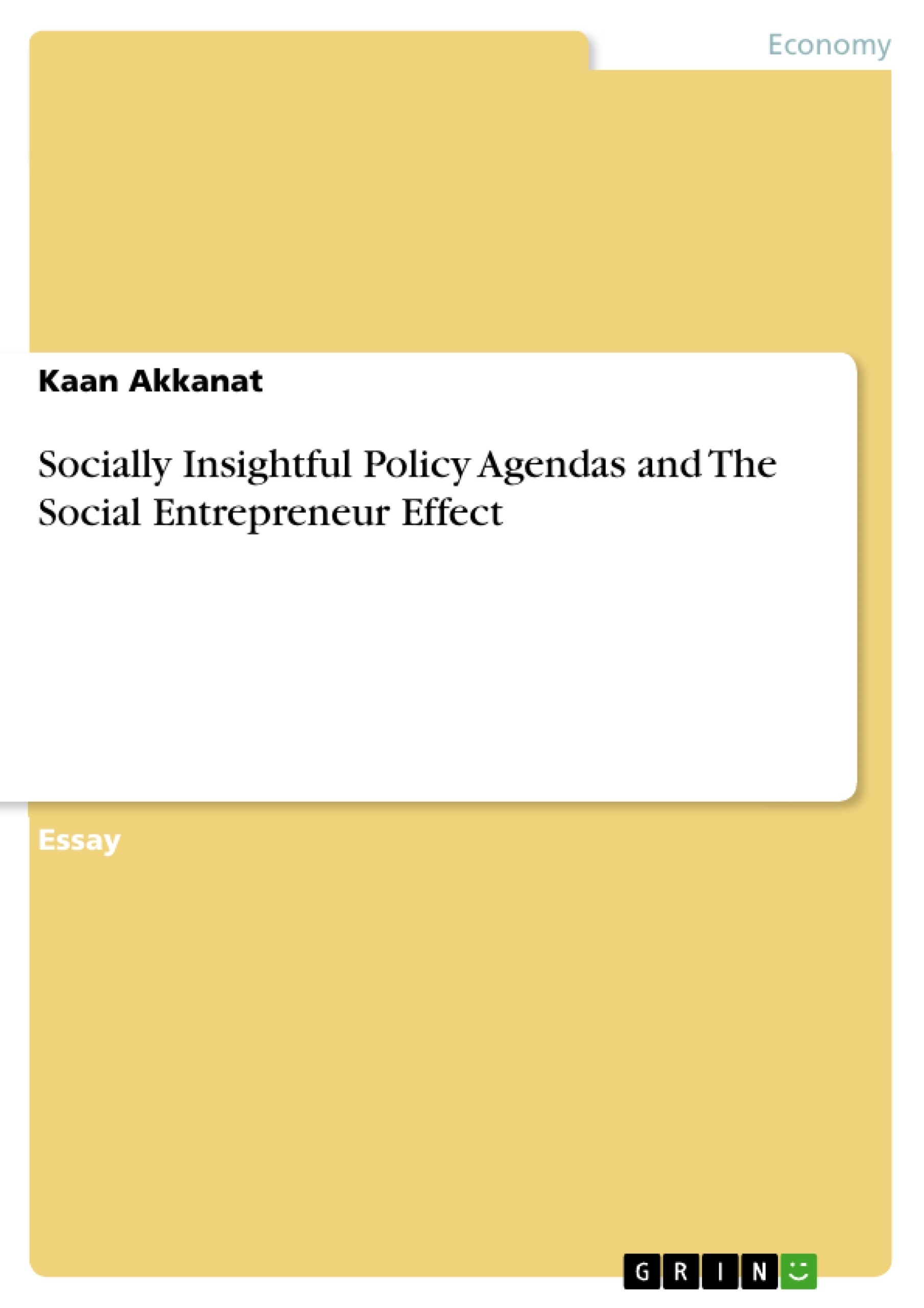"Bringing democratic control to the conduct of foreign policy requires a struggle merely to force the issue onto the public agenda" said E.E Cummings in one of his works where he tried to shed some light on controversial political discussions and issues. Without any doubt, as an American author, E. E Cummings was aware of the importance that relies under having a healthy policy agenda. This importance by itself, is the starting point of the analytic framework that this paper will attempt to construct by emphasizing the dynamics of "socially insightful" policy agendas and combine it with the rising influence of social entrepreneurs on policy agendas. Top-down and bottom-up approaches(under the guidance of Princen and Rhinard) in policy agendas and will be examined in a comparative manner. In addition to these approaches, how social entrepreneurs affect or manipulate (directly/ indirectly) the policy agendas will be discussed with respect to some specific examples. However, before starting the in-depth analysis about the different approaches within policy agendas and how social entrepreneurs affect the flow of it, it would be wiser to re-define the vital elements in research question for the best interest of the eventual shape of analytical framework.
Inhaltsverzeichnis (Table of Contents)
- Socially Insightful Policy Agendas and The Social Entrepreneur Effect
- Defining Social Problems and Their Movement
- Policy Agenda and Its Dynamics
- Social Entrepreneurs: Influencing Policy Agendas
- Top-Down and Bottom-Up Approaches
- Issue Career Stages: Initiation, Specification, Expansion, Entrance
- High and Low Agenda Paths: European Union Example
- Advantages and Disadvantages of Top-Down and Bottom-Up Approaches
- Agenda-Setting Theory and Its Influence
Zielsetzung und Themenschwerpunkte (Objectives and Key Themes)
This essay aims to investigate the dynamics of how social problems rise and fall on the policy agenda and how social entrepreneurs can influence this process.
- Defining social problems and their complex nature
- Understanding the multi-faceted nature of policy agendas
- Exploring the role of social entrepreneurs in shaping policy agendas
- Analyzing the contrasting top-down and bottom-up approaches to policy agenda setting
- Examining the influence of media, public, and corporate agendas on policy agenda setting
Zusammenfassung der Kapitel (Chapter Summaries)
The essay starts by defining social problems, highlighting their inherent subjectivity and the impact of different societal contexts. The concept of a policy agenda is introduced as a multi-dimensional framework for prioritizing issues and influencing institutional actions.
The role of social entrepreneurs in policy agenda setting is then explored, emphasizing their capacity to reframe issues and generate innovative solutions. The essay discusses how social entrepreneurs can contribute to achieving cost-effective, sustainable, and innovative policy outcomes.
Two contrasting approaches to policy agenda setting, top-down and bottom-up, are then analyzed. Top-down approaches are initiated by political leaders and rely on political consensus, while bottom-up approaches emerge from expert groups and utilize technical proposals.
The essay then examines the four stages of an issue's career: initiation, specification, expansion, and entrance, highlighting how these stages differ depending on the approach taken. The European Union serves as an example for illustrating the differences between high and low agenda paths.
The essay concludes by recognizing the advantages and disadvantages of both top-down and bottom-up approaches and emphasizes the influence of agenda-setting theory, which highlights the role of media, public, and corporate agendas.
Schlüsselwörter (Keywords)
This essay focuses on social entrepreneurship, policy agendas, social problems, top-down and bottom-up approaches, issue career stages, agenda-setting theory, and the influence of media, public, and corporate agendas.
Frequently Asked Questions
How do social entrepreneurs influence policy agendas?
Social entrepreneurs influence policy by reframing social problems, generating innovative solutions, and manipulating agenda flows to achieve cost-effective and sustainable outcomes.
What is the difference between top-down and bottom-up policy approaches?
Top-down approaches are initiated by political leaders via consensus, while bottom-up approaches emerge from expert groups and technical proposals.
What are the four stages of an "issue career"?
An issue typically moves through four stages: initiation, specification, expansion, and finally, entrance into the formal policy agenda.
What is the role of Agenda-Setting Theory in this context?
Agenda-setting theory highlights how media, public interest, and corporate agendas interact to prioritize specific social problems for political action.
How does the European Union serve as an example in this study?
The EU is used to illustrate "high" and "low" agenda paths, showing how different institutional structures handle the movement of social problems.
- Quote paper
- Kaan Akkanat (Author), 2012, Socially Insightful Policy Agendas and The Social Entrepreneur Effect, Munich, GRIN Verlag, https://www.grin.com/document/292763



